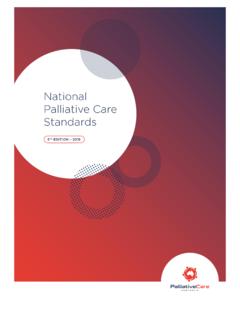Transcription of Core in Palliative Care Concepts
1 HospiceCore in Palliative care ConceptsTraining for teams in any settingFor teams and individuals who care for chronically or seriously ill patientsCore Concepts gives each team member the SKILLS and KNOWLEDGE to help patients live as well and as fully as possible. For nurses,social workers,chaplains,and all professionals 04172018 These courses provide a strong knowledge base for those working on a Palliative care team, as well as skills for professionals in any unit within an organization who periodically provide Palliative online Self-pacedComplete individually or in groupsLearn 760-750-4006 Team training For any OrganizationEvery learner will leave Core Concepts in Palliative care with a deeper understanding of how they can provide appropriate interventions along the disease trajectory, support greater quality of life for patients and families, and reduce content is relevant across all settings including hospitals, ambulatory care clinics.
2 Specialty clinics, skilled nursing facilities, residential facilities, and home hospice or home-based Palliative care programs. An interactive and engaging online learning platform, used by the CSU Institute for Palliative care for its cohort-based and fully online courses, provides total flexibility for each organization, so the staff s learning experience can fit within or outside of workdays, within care units, or across multiple departments and Concepts in Palliative care All Health ProfessionalsThis course is a foundation of knowledge for all staff. It creates a common framework of understanding what Palliative care is, equipping team members with essential tools for communication and working effectively among diverse populations.
3 This course is included with the Nurse, Social Work and Chaplain courses below, or may be completed separately by other professionals. Topics Covered: Introducing core Palliative care Concepts Communication the art and soul of Palliative care Working with diversity through inclusivity Spiritual and existential dimensions of Palliative care Attending to suffering Imminent death Loss and grief Bioethics The necessity of self- care in Palliative care5 CE Hours $199 Learning Outcomes: After completing this course the participant will: Understand the objectives of, and similarities and differences between hospice care and Palliative care Learn effective approaches for overcoming communication barriers View culture and group identification nuances that play out in the life of an individual, and in their healthcare experience and outcomes Recognize that spirituality and existential concerns influence comfort, anxiety, and outcomes, and that interventions can address distress Learn sources of suffering, and understand the assessments and treatments available Identify fears and emotions around imminent death, and strategies to help patients, families.
4 And peers prepare Gain in-depth skills and resources 760-750-4006 from a national healthcare system who completed these courses said: I thought the case studies were very beneficial in that it put the subject matter into a real scenario, which helped with information The structure of the course with the disease specific modules grouped together was very conducive to learning. The course was so helpful for chaplaincy It introduced me to areas of Palliative care that I did not I learned so much about interventions. Core Concepts in Palliative care Nurses This course was built to provide knowledge and skills for nurses to integrate Palliative care into the care of chronically and seriously ill patients.
5 Starting with a review of disease trajectories, the modules move on to the Palliative nursing management of serious illnesses and their associated Covered: The role of the Palliative care nurse Pain assessment and management Opioids for pain management Opioids: clinical considerations and side effects Methadone Palliative care and cardiology Pulmonary disease and associated symptoms Liver disease and associated symptoms End-stage renal disease and associated symptoms Gastrointestinal symptoms in Palliative care Neurodegenerative diseases: ALS, Parkinson s disease, dementia Cancer: overview and oncological emergencies Psychiatric disorders and Palliative care Frailty and Palliative care The role of Palliative care nurses as leaders and advocates17 CE Hours $449 Learning Outcomes: After completing this course the participant will.
6 Know the role, the required expertise, and the nursing process of Palliative care Have skills to perform a pain history and identify a pain intervention plan Understand the nurse s role in pain management and use pain management approaches Identify opioid side effects and treatment considerations Understand methadone s use, its risk factors, and how to mitigate risks For commonly encountered serious illnesses including heart failure, pulmonary disease, liver disease, end-stage renal disease, gastrointestinal disease, neurological diseases and conditions, cancer, frailty, and anxiety and depression: apply knowledge of disease trajectories, articulate their symptoms, use assessment tools, recommend treatments, and understand hospice criteria for them Assess psychological side effects of serious illness, and use interventions to help the seriously and terminally ill Know and employ characteristics of a leader, incorporating these Concepts into daily practice Gain in-depth skills and resources The courses were easy to navigate, but even better was the customer service!
7 Any time we were stuck, the staff at the Institute were amazing, and so responsive! Manager at healthcare organizationA nurse who completed this course said: I liked that it flowed from general Palliative care from a historical, overall view, defining the roles of the different team members, then how we work together to provide holistic care , then taking us to our individual professions and what we do. I appreciated the creative presentation using different ways of learning the content. It interesting and not boring, it was uplifting and refreshing. Learning Outcomes: After completing this course the participant will: Understand roles the Palliative care social worker can fulfill, and how the social worker s core principles align with Palliative care Know and use assessment tools across multiple, interconnected dimensions of a person s life, and among their identified family Recognize the roles of self-awareness and mindfulness in engaging with and supporting patients Define tasks of grief or mourning and apply effective approaches when working with grieving persons Know and employ characteristics of a leader, incorporating these Concepts into daily practice Gain in-depth skills and resources Learn how to bring this education to your organization.
8 760-750-4006 Concepts in Palliative care Social Workers The Social Work Core Concepts course builds on the holistic, patient-centered skills and strengths of social workers to bring into focus the role that social workers play on transdisciplinary teams. You will explore how this foundation is used to address values, ethics, mindfulness, critical thinking and relationships, self- care , resilience, meaning-making, dying, and Covered: The role of the social worker in Palliative care Our foundation: values and ethics Mindfulness and self-awareness Critical skills for the Palliative care social worker Special skills needed for children and the developmentally disabled Working with change, loss, dying, and grief Resilience The role of Palliative care social workers as leaders and advocates10 CE Hours $299 Core Concepts in Palliative care ChaplainsThe Chaplaincy Core Concepts course focuses on chaplaincy practices unique to Palliative care , explores the chaplain s role as a member of an interdisciplinary team, and imparts skills to serve as an advocate for patients, families, and care Covered: Meaning-making, spiritual coping, and grief; cultural influences.
9 Families and groups The role of the chaplain in medical decision-making Religion, spirituality, and health: an integrated model Spiritual care interventions: the art of Palliative care chaplaincy Models of spiritual care assessment and their use Ways to use prayer, meditation and ritual to alleviate spiritual and existential suffering Consent in the practice of chaplaincy Grief and emotional distress Goals, meaning-making and family interventions Pain and stress management Self- care , chaplains as facilitators of resilience Ethics committees, consultation services, and more10 CE Hours $299 Learning Outcomes: After completing this course the participant will: Know the role and scope of the chaplain on the Palliative care team Understand the behavioral sciences that inform the practice of Palliative care chaplaincy, and perform assessment View how the chaplain s work integrates and supports the Palliative care team s plan of care Deliver effective skills training to the Palliative care team and transdisciplinary colleagues Teach and model resilience to clinicians Demonstrate leadership skills that support the spiritual health of the organization Gain in-depth skills and resources







